| Listing 1 - 10 of 22 | << page >> |
Sort by
|
Book
ISBN: 0289798132 Year: 1971 Publisher: London Studio Vista
Abstract | Keywords | Export | Availability | Bookmark
 Loading...
Loading...Choose an application
- Reference Manager
- EndNote
- RefWorks (Direct export to RefWorks)
Politics --- Film --- 791.43 --- Motion pictures in propaganda --- Politics in motion pictures --- #SBIB:309H1328 --- Motion pictures --- Moving-pictures in propaganda --- Propaganda in motion pictures --- Propaganda --- Filmkunst. Films. Cinema --- Films met een ideologische en spiegelfunctie --- Motion pictures in propaganda. --- Politics in motion pictures. --- 791.43 Filmkunst. Films. Cinema
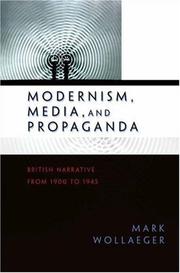
ISBN: 9780691128115 9780691138459 0691128111 0691138451 9786612157639 1282157639 1400828627 Year: 2007 Publisher: Princeton, N.J. : Princeton University Press,
Abstract | Keywords | Export | Availability | Bookmark
 Loading...
Loading...Choose an application
- Reference Manager
- EndNote
- RefWorks (Direct export to RefWorks)
Though often defined as having opposite aims, means, and effects, modernism and modern propaganda developed at the same time and influenced each other in surprising ways. The professional propagandist emerged as one kind of information specialist, the modernist writer as another. Britain was particularly important to this double history. By secretly hiring well-known writers and intellectuals to write for the government and by exploiting their control of new global information systems, the British in World War I invented a new template for the manipulation of information that remains with us to this day. Making a persuasive case for the importance of understanding modernism in the context of the history of modern propaganda, Modernism, Media, and Propaganda also helps explain the origins of today's highly propagandized world. Modernism, Media, and Propaganda integrates new archival research with fresh interpretations of British fiction and film to provide a comprehensive cultural history of the relationship between modernism and propaganda in Britain during the first half of the twentieth century. From works by Joseph Conrad to propaganda films by Alfred Hitchcock and Orson Welles, Mark Wollaeger traces the transition from literary to cinematic propaganda while offering compelling close readings of major fiction by Virginia Woolf, Ford Madox Ford, and James Joyce.
English fiction --- Modernism (Literature) --- Motion pictures in propaganda. --- Propaganda --- History and criticism. --- History --- Motion pictures in propaganda --- Moving-pictures in propaganda --- Propaganda in motion pictures --- Communication in politics --- Political psychology --- Social influence --- Advertising --- Persuasion (Psychology) --- Psychological warfare --- Public relations --- Publicity --- Social pressure --- History and criticism
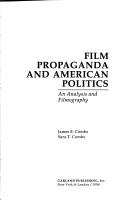
ISBN: 0815313225 9780415726597 9781315855899 9781317929048 9781317929055 9781138991033 Year: 2014 Publisher: London New York : Routledge,
Abstract | Keywords | Export | Availability | Bookmark
 Loading...
Loading...Choose an application
- Reference Manager
- EndNote
- RefWorks (Direct export to RefWorks)
#SBIB:309H1331 --- #SBIB:309H271 --- #SBIB:AANKOOP --- Films met een persuasieve functie (met inbegrip van de propaganda- en reclamefilm) --- Politieke communicatie: toepassingsgebieden --- Cinéma et propagande --- Publicité politique --- Politics in motion pictures. --- Science politique --- Cinéma et politique --- Motion pictures in propaganda --- Motion pictures --- Advertising, Political --- Au cinéma --- History. --- Political aspects --- Politics in motion pictures --- Moving-pictures in propaganda --- Propaganda in motion pictures --- Propaganda --- History --- Au cinéma.
Book
ISBN: 0748653600 1281357669 9786611357665 0748632433 9780748632435 Year: 2008 Publisher: New Haven : Yale University Press,
Abstract | Keywords | Export | Availability | Bookmark
 Loading...
Loading...Choose an application
- Reference Manager
- EndNote
- RefWorks (Direct export to RefWorks)
This book explores how Soviet film worked with time, the past, and memory. It looks at Stalinist cinema and its role in the production of history, the conversion of the present and experience into history, mechanisms of transfer, and what is located between history and the past. The representation of history is always the representation of power. The institution of legitimization and the mechanism for the production of identity, history is the past, constructed and served by the authorities who are attempting to curtail the experience by packaging it into a literary narrative and new visual im
Motion pictures --- Motion pictures and history. --- Motion pictures in propaganda --- Communism and motion pictures --- Communism and moving-pictures --- Motion pictures and communism --- Moving-pictures in propaganda --- Propaganda in motion pictures --- Propaganda --- History and motion pictures --- Moving-pictures and history --- History --- History.
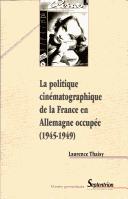
ISBN: 275742694X 2859399038 9782859399030 Year: 2020 Publisher: Villeneuve d'Ascq : Presses universitaires du Septentrion,
Abstract | Keywords | Export | Availability | Bookmark
 Loading...
Loading...Choose an application
- Reference Manager
- EndNote
- RefWorks (Direct export to RefWorks)
En 1945, après avoir constitué un puissant instrument de propagande sous le Troisième Reich, le cinéma allemand est réduit à néant et se trouve soumis au bon vouloir des puissances d’occupation. Tout en affirmant sa volonté de dénazifier et de rééduquer les Allemands, chacune d’elles entreprend de relancer et de développer les activités cinématographiques d’une façon conforme à ses intérêts. Cette étude se propose de cerner les caractéristiques, l’évolution et le rayonnement de l’action menée par les Français. L’importance qu’ils accordent au cinéma se traduit par de nombreuses mesures : réouverture des salles, installation d’ateliers et de studios, création de sociétés francoallemandes, sélection et diffusion de films français, organisation de galas et de festivals, mise en place de ciné-clubs… Si certaines réalisations s’inscrivent dans une politique de rééducation, d’autres dénotent une volonté de rehausser le prestige de la France et d’implanter le cinéma français en Allemagne. En même temps, des accords passés avec les autres puissances d’occupation témoignent de l’impact du contexte international (émergence de la Guerre Froide et adhésion progressive de la France à la politique anglo-américaine) sur le cinéma.
Motion pictures --- Motion pictures, French --- Motion pictures in propaganda. --- Political aspects. --- History. --- France --- Germany --- Relations --- Moving-pictures in propaganda --- Propaganda in motion pictures --- Propaganda --- French motion pictures --- Foreign films --- Cinema --- Feature films --- Films --- Movies --- Moving-pictures --- Audio-visual materials --- Mass media --- Performing arts --- History and criticism --- politique --- Occupation --- cinéma --- Cinéma --- Cinéma dans la propagande --- Aspect politique --- Histoire --- Allemagne
Book
ISBN: 9780786447183 Year: 2011 Publisher: Jefferson, NC London McFarland
Abstract | Keywords | Export | Availability | Bookmark
 Loading...
Loading...Choose an application
- Reference Manager
- EndNote
- RefWorks (Direct export to RefWorks)
"This critical text examines the seventy-year history of comic book superheroes on film and in comic books and their reflections of the politics of their time. Superheroes addressed include Batman, Wonder Woman, Spider-Man, Superman, the Invisible Woman and the X-Men, and topics covered include American wars, conflicts, and public policy"--Provided by publisher.
Propaganda in de film --- Propaganda in motion pictures --- Propagandafilms --- Propagande dans le cinéma --- Superheroes. --- Comic books, strips, etc. --- Superhero films --- Propaganda in motion pictures. --- Motion pictures --- Superheroes --- Political aspects. --- Moral and ethical aspects. --- History and criticism. --- History --- Comic books, strips, etc --- Comic strip superhero films --- Comic strip superheroes films --- Superheroes films --- Fantasy films --- Science fiction films --- Comic book heroes --- Super heroes --- Fictitious characters --- Moving-pictures in propaganda --- Propaganda --- Comic strips --- Comics --- Funnies --- Manga (Comic books, strips, etc.) --- Manhua (Comic books, strips, etc.) --- Manhwa (Comic books, strips, etc.) --- Serial picture books --- Caricatures and cartoons --- Wit and humor, Pictorial --- Moral and ethical aspects --- Political aspects --- History and criticism --- United States --- 20th century --- Manhua (Comic books) --- Manhwa (Comic books) --- 82-931 --- 070.84 --- 741.5 --- 741.5 Spotprenten. Karikaturen. Cartoons. Striptekeningen. Satirische tekeningen --- Spotprenten. Karikaturen. Cartoons. Striptekeningen. Satirische tekeningen --- 070.84 Comics. Stripverhalen--(in de krant) --- Comics. Stripverhalen--(in de krant) --- 82-931 Stripverhaal --- Stripverhaal --- Drawing --- Thematology --- beeldverhalen
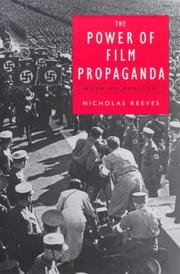
ISBN: 0304338729 0304338710 9780304338726 9780304338719 Year: 1999 Publisher: London : Cassell,
Abstract | Keywords | Export | Availability | Bookmark
 Loading...
Loading...Choose an application
- Reference Manager
- EndNote
- RefWorks (Direct export to RefWorks)
In the years before television, it was widely assumed that the cinema could exercise enormous influence over the mass audience. Governments and revolutionary intellectuals, party politicians and individual filmmakers, all believed that film offered a uniquely effective means of manipulating the ideology of the masses and thus, notwithstanding their very different ideological objectives, films as different as "The Battleship Potemkin", "Triumph of the Will", and "In Which We Serve" were all the product of the same assumptions about the immense power of film as a medium of political propaganda. In this book, the author re-examines these assumptions. Drawing on recent historical scholarship, he explores five different case studies to see whether or not propaganda films reached the audiences at which they were targeted at and, where they did, whether the films made the impact on those audiences that the propagandists had expected.
Advertising. Public relations --- Film --- anno 1930-1939 --- anno 1940-1949 --- anno 1920-1929 --- Europe --- #SBIB:309H1331 --- #SBIB:AANKOOP --- Nicholas Reeves --- film --- filmgeschiedenis --- film en propaganda --- film en politiek --- oorlogspropaganda --- Groot-Brittannië --- Sovjet-Unie --- Duitsland --- nazisme --- neorealisme --- Italië --- wereldoorlogen --- twintigste eeuw --- fascisme --- 791.43 --- Films met een persuasieve functie (met inbegrip van de propaganda- en reclamefilm) --- Motion pictures in propaganda --- History. --- History --- Propaganda in motion pictures --- Moving-pictures in propaganda --- Propaganda --- Motion pictures --- Politics in motion pictures
Book
ISBN: 9781848850088 1848850085 1848850093 9781848850095 Year: 2009 Volume: *5 Publisher: London ; New York I.B. Tauris Publishers
Abstract | Keywords | Export | Availability | Bookmark
 Loading...
Loading...Choose an application
- Reference Manager
- EndNote
- RefWorks (Direct export to RefWorks)
"When the Bolsheviks seized power in the Soviet Union during 1917, they were suffering from a substantial political legitimacy deficit. Uneasy political foundations meant that they were always on the defensive and cinema became a key part of the strategy to protect the existence of the USSR. This welcome book shows how one of film's central functions was as an important means of convincing the masses that the regime was legitimate and a bearer of historical truth. Based on extensive research in archives and primary sources, the book examines the interaction between politics and the Soviet cinema industry during the period between Stalin's rise to power and the beginning of the Great Patriotic War. This was the era when the Bolsheviks were trying to develop a 'cinema for the millions', which sought to engage Soviet citizens politically by carefully blending entertainment with the communist message. Jamie Miller investigates how political and administrative decision-making, censorship, thematic planning and purges were shaped by the Bolsheviks' defensive outlook, which in turn had a largely negative impact on the production process. He examines the role of film unions and societies, compares the development of two different studios and looks at the education system for cinema personnel. He also analyses key films of the period, including the classic musical Circus, the class enemy drama The Party Card and the political epic The Great Citizen."--Page 4 of cover.
Motion pictures --- Motion pictures in propaganda --- Communism and motion pictures --- Political aspects --- History --- #SBIB:309H1313 --- Communism and moving-pictures --- Motion pictures and communism --- Moving-pictures in propaganda --- Propaganda in motion pictures --- historia --- Cinéma dans la propagande --- Communisme et cinéma --- Cinéma dans la propagande --- Communisme et cinéma --- Film --- Russia --- Cinéma --- Aspect politique --- Propaganda --- History. --- Geschiedenis en/of organisatie van het filmwezen: algemeen en per land (met inbegrip van de rol van het filmwezen in de ontwikkelingsproblematiek)
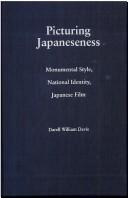
ISBN: 0231102313 9780231102315 9780231102308 Year: 1996 Publisher: New York (N.Y.): Columbia university press
Abstract | Keywords | Export | Availability | Bookmark
 Loading...
Loading...Choose an application
- Reference Manager
- EndNote
- RefWorks (Direct export to RefWorks)
791.43 <5> --- Filmkunst. Films. Cinema--Azië --- Motion pictures in propaganda --- Motion pictures --- National characteristics, Japanese. --- Political aspects --- Social aspects --- 791.43 <5> Filmkunst. Films. Cinema--Azië --- National characteristics, Japanese --- Japanese national characteristics --- Cinema --- Feature films --- Films --- Movies --- Moving-pictures --- Audio-visual materials --- Mass media --- Performing arts --- Moving-pictures in propaganda --- Propaganda in motion pictures --- Propaganda --- History and criticism --- J6839 --- J4122 --- J4126 --- Japan: Media arts and entertainment -- cinema --- Japan: Sociology and anthropology -- nationalism --- Japan: Sociology and anthropology -- media and (mass) communications
Book
ISBN: 9781788311908 Year: 2019 Publisher: London : Bloomsbury,
Abstract | Keywords | Export | Availability | Bookmark
 Loading...
Loading...Choose an application
- Reference Manager
- EndNote
- RefWorks (Direct export to RefWorks)
Engaging with key films from the decade and a half between 1949 and '66, this book explores the aesthetic experiment of socialist cinema in China. In the years succeeding the Communist Revolution, the state produced a diversity of genres that functioned as propaganda for the newly established People's Republic. Breaking from past forms, revolutionary cinema adapted and revised Chinese literature for the screen, incorporated aspects of Hollywood narration and appropriated Soviet montage theory for its own means, as well as orchestrating a new, glamorous, socialist star culture. Chinese film periodicals were quick to project and disseminate the country's redefined self-image to both domestic and international domains as they helped to create an alternative vision of modernity and internationalism.
Motion pictures in propaganda --- Motion pictures --- History --- Political aspects. --- Political aspects --- China --- S04/0910 --- S04/0920 --- S06/0900 --- S17/0430 --- S17/2000 --- Moving-pictures in propaganda --- Propaganda in motion pictures --- Propaganda --- Cinema --- Feature films --- Films --- Movies --- Moving-pictures --- Audio-visual materials --- Mass media --- Performing arts --- China: History--PRC: 1949 - 1958 --- China: History--PRC: 1958 - 1966 --- China: Politics and government--Political propaganda --- China: Art and archaeology--Esthetics --- China: Art and archaeology--Film --- History and criticism
| Listing 1 - 10 of 22 | << page >> |
Sort by
|

 Search
Search Feedback
Feedback About
About Help
Help News
News